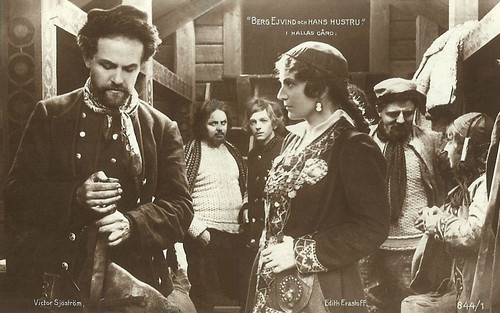
Swedish postcard by Nordisk Konst, Stockholm, no. 844/1. Photo: Svenska Biografteatern AB. Publicity still for Berg-Ejvind och hans hustru/The Outlaw and His Wife (Victor Sjöström, 1918) with Victor Sjöström and Edith Erastoff. Caption: At Halla's farm.
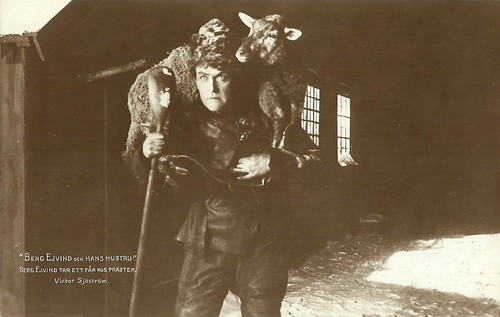
Swedish postcard by Nordisk Konst, Stockholm, no. 844/2. Photo: Svenska Biografteatern AB. Publicity still for Berg-Ejvind och hans hustru/The Outlaw and His Wife (Victor Sjöström, 1918) with Victor Sjöström. Caption: Berg-Ejvind steals a sheep from the priest.
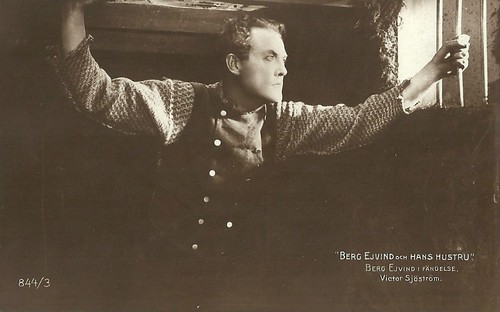
Swedish postcard by Nordisk Konst, Stockholm, no. 844/3. Photo: Svenska Biografteatern AB. Publicity still for Berg-Ejvind och hans hustru/The Outlaw and His Wife (Victor Sjöström, 1918) with Victor Sjöström. Caption: Berg-Ejvind in prison.
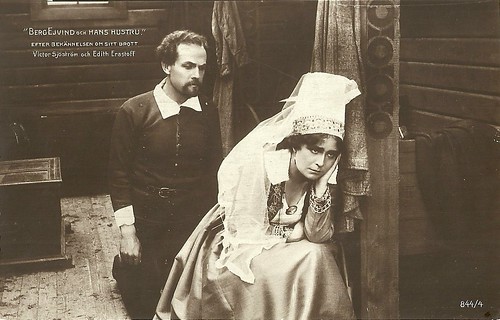
Swedish postcard by Nordisk Konst, Stockholm, no. 844/3. Photo: Svenska Biografteatern AB. Publicity still for Berg-Ejvind och hans hustru/The Outlaw and His Wife (Victor Sjöström, 1918) with Victor Sjöström and Edith Erastoff. Caption: After the confession of the crime.
Freezing together to death
Berg-Ejvind och hans hustru/The Outlaw and His Wife takes place in Iceland in mid-18th century. The outlaw Arnes (John Ekman) helps a stranger called Kari (Victor Sjöström) to start to work at the farm of widow Halla (Edith Erastoff).
Halla's brother-in-law Björn (Nils Aréhn) wants to marry her for economic purposes, but she refuses him. Instead Halla and the stranger fall in love. When he is revealed as Berg-Eyvind, an escaped thief forced into crime by his family's starvation (he stole a sheep from a priest who refused to help him), Halla abandons all and they flee. Berg-Eyvind and Halla become two of the many outlaws of Iceland's mountains.
For five years they lead a happy life and have a daughter Tota, but then Ejvind's old friend Arnes shows up, who first is hosted by the family but then starts to desire Halla. A fight between the men follows and Arnes leaves, meeting Björn and his men who have discovered the tracks of Halla and Berg-Ejvind.
During a fierce fight Halla is so afraid her child will be taken away that she throws it off a cliff. The couple manages to flee and retreat into the highest mountains. Over the years the situation becomes precarious. Halla is so overcome with guilt and longing for death she walks into a snowstorm. Eyvind finds the hut empty, goes out and finds her more death than alive and decides to freeze to death together with her.
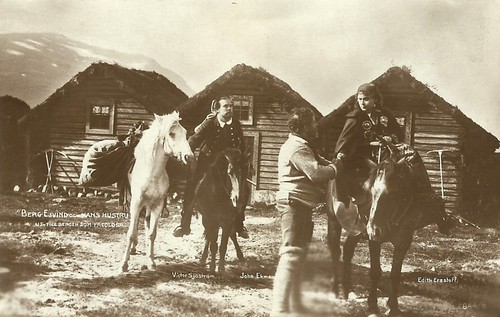
Swedish postcard by Nordisk Konst, Stockholm, no. 844/5. Photo: Svenska Biografteatern AB. Publicity still for Berg-Ejvind och hans hustru/The Outlaw and His Wife (Victor Sjöström, 1918) with Edith Erastoff, John Ekman and Victor Sjöström. Caption: Out into to the hills as outlaws.
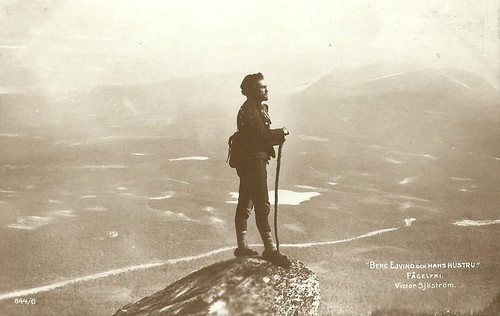
Swedish postcard by Nordisk Konst, Stockholm, no. 844/6. Photo: Svenska Biografteatern AB. Publicity still for Berg-Ejvind och hans hustru/The Outlaw and His Wife (Victor Sjöström, 1918) with Victor Sjöström. Caption: The Outlaw.
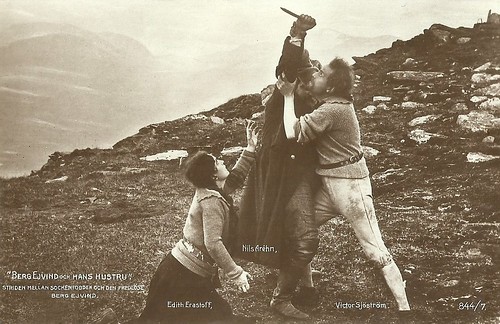
Swedish postcard by Nordisk Konst, Stockholm, no. 844/7. Photo: Svenska Biografteatern AB. Publicity still for Berg-Ejvind och hans hustru/The Outlaw and His Wife (Victor Sjöström, 1918) with Edith Erastoff, Nils Aréhn and Victor Sjöström. Caption: The battle between the parish bailiff and the outlaw.
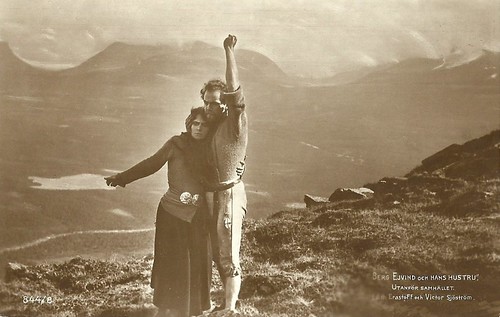
Swedish postcard by Nordisk Konst, Stockholm, no. 844/8. Photo: Svenska Biografteatern AB. Publicity still for Berg-Ejvind och hans hustru/The Outlaw and His Wife (Victor Sjöström, 1918) with Victor Sjöström and Edith Erastoff. Caption: Outside society.
The most beautiful film Louis Deluc saw until then
Berg-Ejvind och hans hustru/The Outlaw and His Wife is based on Fjalla-Eyvind (1911), a play by the Icelandic playwright Jóhann Sigurjónsson. The film is one of the classics of Swedish silent cinema.
Although Berg-Ejvind och hans hustru/The Outlaw and His Wife is set in Iceland, it was actually filmed in the North of Sweden, at Åre and Abisko. It showed not only a realist vision of the hardship of nature but also of the intolerance of humans.
Shot in 1917, Berg-Ejvind och hans hustru/The Outlaw and His Wife was released in 1918 in Sweden. Abroad it was released later. e.g. in Germany in 1922. When the film premiered, both Victor Sjöström's direction and the the cinematography by Julius Jaenzon was praised.
French critic Louis Deluc called it the most beautiful film he saw until then, praising the director, the two leading actors and the landscape as the 'third protagonist'. Later critics like Georges Sadoul and Peter Cowie would confirm this. Cowie compared Berg-Eyvind to the knight in Ingmar Bergman's Det sjunde inseglet/The Seventh Seal (1957), both refusing to succumb to their fate until the very end. In a scene in which he is dangling on a rope above a cliff and saved just in time (a scene in which Sjöström truly risked his life), Berg-Eyvind shows he is a survivor, Cowie writes.
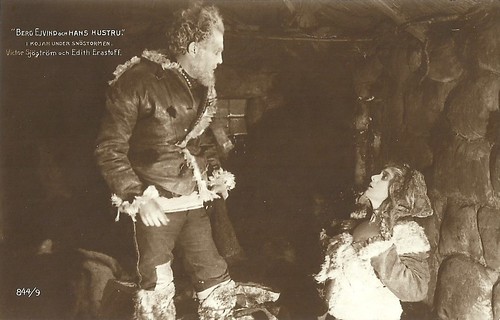
Swedish postcard by Nordisk Konst, Stockholm, no. 844/9. Photo: Svenska Biografteatern AB. Publicity still for Berg-Ejvind och hans hustru/The Outlaw and His Wife (Victor Sjöström, 1918) with Victor Sjöström and Edith Erastoff. Caption: In the hut during the snowstorm.
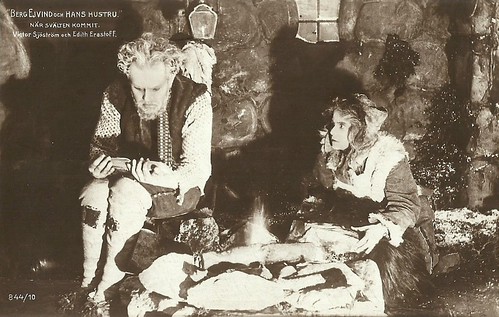
Swedish postcard by Nordisk Konst, Stockholm, no. 844/10. Photo: Svenska Biografteatern AB. Publicity still for Berg-Ejvind och hans hustru/The Outlaw and His Wife (Victor Sjöström, 1918) with Victor Sjöström and Edith Erastoff. Caption: When hunger comes.
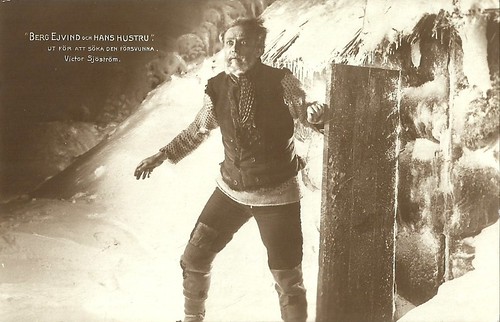
Swedish postcard by Nordisk Konst, Stockholm, no. 844/11. Photo: Svenska Biografteatern AB. Publicity still for Berg-Ejvind och hans hustru/The Outlaw and His Wife (Victor Sjöström, 1918) with Victor Sjöström. Caption: Out to seek the lost.

Swedish postcard by Nordisk Konst, Stockholm, no. 844/12 (final card and final scene of the film). Photo: Svenska Biografteatern AB. Victor Sjöström and Edith Erastoff in Berg-Ejvind och hans hustru/The Outlaw and His Wife (Victor Sjöström, 1918). Caption: Death in the snowstorm.
Sources: Wikipedia (English, Swedish, German and French) and IMDb.
This post was last updated on 15 July 2022.
2 comments:
thank you. I have been looking for these. They were on the Internet from a store in Stockholm several years ago.
I appreciate it a lot.
Scott Lord on Victor Sjostrom
Thanks Scott. Check out our today's post about Maurits Stiller's Herr Arnes Pengar: http://filmstarpostcards.blogspot.nl/2017/01/herr-arnes-pengar-1919.html
Post a Comment